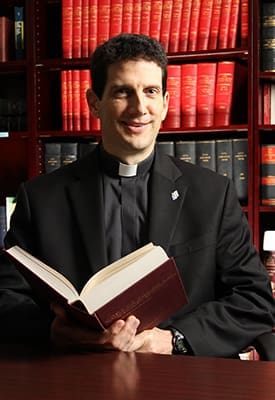Smyrna
Father Daniel Ketter appointed Atlanta’s judicial vicar
By ANDREW NELSON, Staff Writer | Published October 5, 2017
SMYRNA—Father Daniel Ketter was recently appointed the judicial vicar of the Metropolitan Tribunal by Archbishop Wilton D. Gregory. Ordained in 2008, Father Ketter has served in the archdiocesan Tribunal since 2015. He earned a licentiate in canon law that same year from Catholic University of America in Washington, D.C.

Father Daniel Ketter succeeded Bishop Luis R. Zarama, the new bishop for the Diocese of Raleigh, as the judicial vicar for the Archdiocese of Atlanta’s Metropolitan Tribunal Sept. 1. Father Ketter, a 1988 graduate of Marist School, Atlanta, was ordained a priest in 2008. Photo By Michael Alexander
Father Ketter is a 1988 graduate of Marist School, Atlanta.
The ministry of the Metropolitan Tribunal includes all matters concerning the application and practice of canon law within the archdiocese. The Tribunal functions as the appeals court for the provinces of Atlanta, including the dioceses of Charlotte, Charleston, Raleigh and Savannah. The court also handles all matters of permissions and dispensations pertaining to marriage.
The judicial vicar is the presiding judge of the Tribunal.
Father Ketter answered a few questions from The Georgia Bulletin about his new position. The responses were edited for space.
Georgia Bulletin: You studied English in college and then worked in healthcare IT. What drew you to specialize in canon law, studying at Catholic University of America? What appeals to you about that area of the church?
Father Ketter: The only reason I pursued a degree in canon law was because the archbishop identified a need and asked me to help meet it. Like most priests I was anticipating spending my entire priestly ministry in our parishes and schools. However, we make a promise of obedience to the archbishop on the day of our ordination, which means that barring any serious reason to the contrary we serve where he determines there is the most pressing need. As priests we have to trust that God manifests his will to us through the assignments we are given by the archbishop.
Georgia Bulletin: What are your duties as judicial vicar?
Father Ketter: The judicial vicar has administrative responsibility for the work of the archdiocesan Tribunal. Among other things this means ensuring we are appropriately staffed to handle the case load, assigning judges to individual cases, assuring we follow the procedural norms of church law and, ultimately, guaranteeing that justice is provided in a timely manner for those who seek our service.
Georgia Bulletin: What opportunities do you see at the Tribunal, having worked there since 2015?
Father Ketter: Pope Francis has asked that the tribunals of the church move closer to the people, be more accessible to them. I think there are a number of things we can do to realize that. Like most tribunals in the United States our tribunal processes cases almost entirely through written correspondence. The law of the church, however, envisions the ministers of the Tribunal meeting face to face with the people whose cases we are hearing. While this will demand more time and improved coordination, I think it will allow the people we serve to feel as though they have been ministered to and not simply “processed” or regarded as a piece of paper.
Georgia Bulletin: Pope Francis in late 2015 revised the annulment process. How has that changed things in the archdiocesan Tribunal?
Father Ketter: Our cup runneth over! Since Pope Francis’ changes to the marriage nullity process, the number of petitions submitted to our Tribunal and tribunals around the country have increased significantly. Here in Atlanta we saw a 33 percent increase in petitions in 2016. So the volume of work is one of the biggest changes that has resulted from the Holy Father’s changes. Another significant change has been the restructuring of the Court of Appeals. Every tribunal must have an appellate court to which they send cases that are appealed. Per the Holy Father’s urging, our Tribunal now serves as the appellate court for the other dioceses of our province while the Archdiocese of Cincinnati is now our appellate court.
Georgia Bulletin: How many cases did the Tribunal decide in the recently completed year? Is that more or less than five years ago? How many people staff the Tribunal?
Father Ketter: In 2016 we completed 634 cases. The number of cases received and decided by our Tribunal has been steadily increasing for many years, mirroring the steady growth of our archdiocese. We have 12 full-time staff members in the Tribunal and several who work part-time.
Georgia Bulletin: What would you like the Catholic community to know about the Tribunal and its mission in the archdiocese?
Father Ketter: The work of the Tribunal is not distinct or separate from the pastoral mission of the church but rather is an essential part of it. The last canon in the Code of Canon law states the supreme law in the church is the salvation of souls and reminds those who work in the Tribunal that in all they do they must keep that law before their eyes.